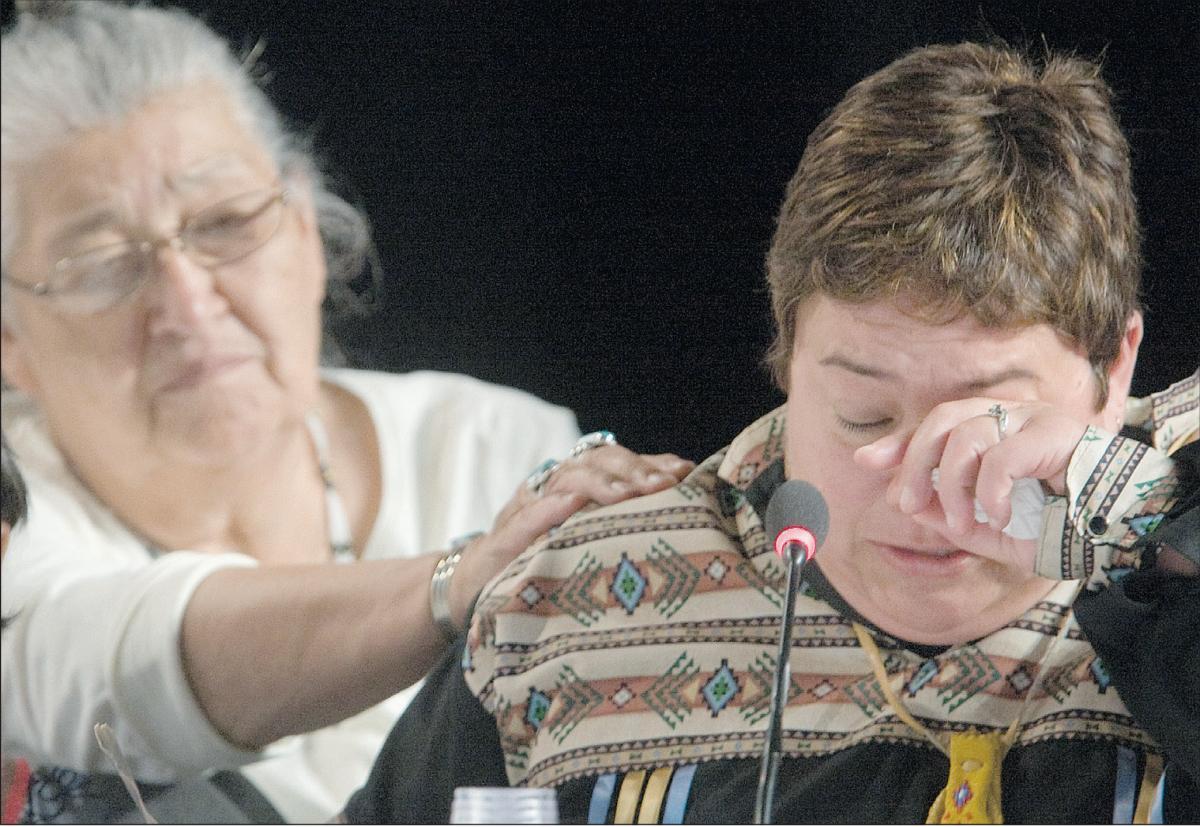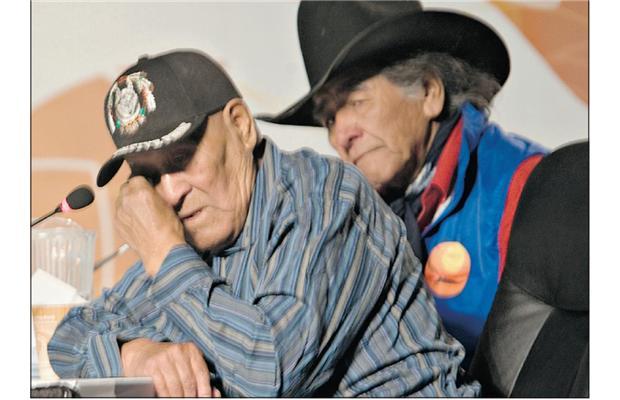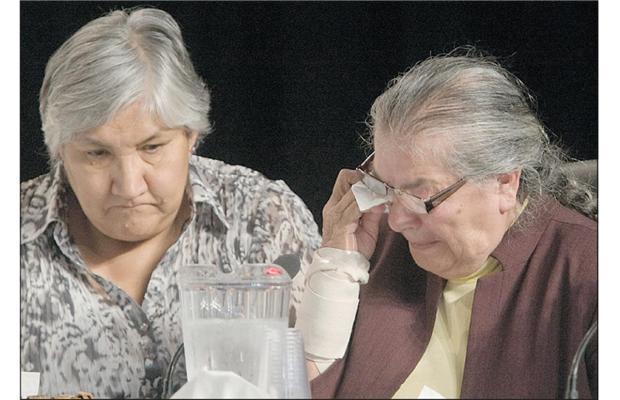Residential Schools Harmed Generations
By Jeremy Warren
There are survivors of residential schools and then there are their descendants, who often survived their own abuse and social problems that are the system's legacy, said several people testifying at the national Truth and Reconciliation Commission event in Saskatoon. Former residential school students gave public testimonies about their experiences alongside younger generations of aboriginal people who told their own stories of surviving dysfunctional families and social struggles. The "inter-generational effects," as people called them, have done as much harm as residential schools, the commission heard during the four-day event. Marcia Mirasty testified at Saturday's commissioners' sharing panel with her mother, a residential school survivor. The Flying Dust First Nation health director talked about family violence and neglect, sexual and substance abuse and other health problems that survivors and their families have faced. "We have a generation of parents who don't know how to parent," Mirasty said after her testimony. "A lot of parenting skills were broken." Her mother, Neva Mirasty, was taken from her family on Red Pheasant First Nation at the age of nine and placed in the Thunderchild residential school at Delmas. The nuns at the school cut her braids and gave her a French name that roughly translated to "Little Savage." "I was lonesome and I cried all the time," Neva told the commissioners' panel. At age 12, Neva was called into the priest's office near the school and the man offered her a chocolate from his desk. She took one and he offered another. When she reached out to take one, the priest grabbed her arm and pulled her onto his lap. "He grabbed me tight and was kissing me all over and touched me 'down there,' " Neva said. "I bit him on the cheek so hard. He dropped me and I ran to the school screaming and crying." The priest chased her and cornered her in the bathroom, where she had locked herself in a stall. The priest kicked and screamed and Neva passed out. When she woke up the nuns told her to keep quiet and never talk about the incident. "From then on I always had my head down and I never spoke," Neva said. "I was scared all the time." The priest eventually moved away and the school burned down in January 1948. It took a few decades before Neva could heal from the experience. She found God while sick in bed at age 36 when she had a vision of the Bible, which she had never read or even touched despite going to a school run by priests and nuns. Neva credits her faith for helping heal her and her family. "There is healing and forgiveness and I thank God for this wonderful life and wonderful family," said Neva, who with her husband of 54 years, has 11 children, 35 grandchildren and 45 great-grandchildren. The commission and the thousands of people who attended the event heard survival stories from hundreds of former students and their families. More than 150,000 First Nations, Metis and Inuit children were forced into residential schools run by churches and the Canadian government. The commission was established as part of the Indian Residential Schools Settlement Agreement. "Listening to everyone's stories these past few days has given me hope and I know I'm not alone out there," said Kelly Anderson, who came to Saskatoon from Ontario with the Anglican Church's Aboriginal Healing Foundation. Anderson's father, who went to a residential school, had a drinking problem and died when a train ran him over. The unstable family situation led to her own problems as she struggled with abuse, Anderson told the commission on Sunday. She had to give up her two children. "My kids ask me why I'm not there for them and I don't know what to tell them," Anderson said. "My parents weren't there for me and I wasn't there for my children. It's an endless cycle." Anderson is sober now and has a support system she can rely on to help her overcome the personal struggles stemming from her family's experience at residential schools, and now she's open about those struggles with her children. "I try to lead by example," Anderson said. Saskatoon police Chief Clive Weighill made a statement of reconciliation on Sunday that focused on the long legacy of residential schools. Police in Saskatoon and elsewhere are grappling with the "psychological and social fallout" of the residential school system, said Weighill, hinting at the disproportionate number of aboriginal people in the justice system. Weighill mentioned the Neil Stonechild inquiry - "a dark period in our history," he said - before launching into a list of reforms in the police department that came out of the inquiry, including the addition of a cultural relations unit, mandatory diversity training, an improved complaints process and regular meeting with aboriginal groups. "The members of the police service have worked diligently to repair relationships between First Nations, Metis and Inuit peoples," Weighill said. "We know there is much work left to do. It takes time to heal and build trust." The police will also establish at its new headquarters a memorial that honours missing and murdered aboriginal women, Weighill told the crowd, which responded with applause. Kimberly Quinney, 38, is the Saskatchewan liaison for the commission and she has her own story to tell. With parents and grandparents who were in the residential school system in Alberta, she too felt the effects of the old assimilation policies, she said. But she didn't always understand why her family functioned the way it did. "I didn't know until my mid-20s about the connections to residential schools," she said in an interview. "It was kept quiet. I didn't understand why my family was the way it was." Quinney started working on residential school files with the Federation of Saskatchewan Indian Nations in Saskatoon and started asking more questions. She travelled to Winnipeg with her mother for the first commission event, where her mother ended up sharing her survival story. "Then I understood," Quinney said. "You need to hear the stories to honour and respect your parents." Survivors brought home their troubles, which often spread through the generations, Quinney said. "I went down the path of destruction with drugs and alcohol," she said. "I went through my own abuses but I didn't know where it came from. You learn from your parents and what are we teaching our children if we are living in dysfunction?" Now four years sober, Quinney believes her work with the commission keeps her strong. Contact: jjwarren@thestarphoenix.com
|
.
Any original material on these pages is copyright © BishopAccountability.org 2004. Reproduce freely with attribution.


